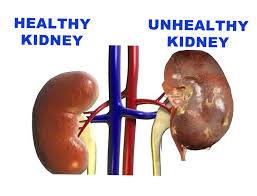The kidney is an essential organ of the body responsible for filtering the blood, removing waste products, and regulating the body's fluid balance. When the kidneys are not functioning correctly, it can lead to a range of health problems.
Causes of Kidney Problems:
Diabetes: High levels of blood sugar can damage the blood vessels in the kidneys and lead to diabetic nephropathy.
High Blood Pressure: High blood pressure can damage the small blood vessels in the kidneys and reduce their ability to function correctly.
Kidney Stones: These are hard mineral deposits that can block the urinary tract and cause severe pain and discomfort.
Infections: Infections of the urinary tract, such as pyelonephritis, can cause kidney damage if left untreated.
Polycystic Kidney Disease: This is a genetic condition that causes cysts to form in the kidneys, leading to kidney failure over time.
Symptoms of Kidney Problems:
Fatigue and Weakness: When the kidneys are not functioning correctly, waste products can build up in the body, leading to feelings of fatigue and weakness.
Urinary Problems: Kidney problems can lead to frequent urination, painful urination, or difficulty urinating.
Swelling: Kidney problems can cause fluid retention, leading to swelling in the legs, feet, and ankles.
High Blood Pressure: Kidney problems can cause high blood pressure, which can lead to heart disease and stroke.
Nausea and Vomiting: When the kidneys are not functioning correctly, waste products can build up in the body, leading to feelings of nausea and vomiting.
Treatment of Kidney Problems:
The treatment of kidney problems depends on the underlying cause of the problem. In some cases, lifestyle changes such as diet and exercise may be enough to manage the problem. In other cases, medication or surgery may be necessary.
Medications: Medications may be prescribed to control blood pressure, reduce inflammation, or manage diabetes.
Dialysis: Dialysis is a medical procedure that involves removing waste products and excess fluid from the blood.
Kidney Transplant: In severe cases of kidney disease, a kidney transplant may be necessary.
Lifestyle Changes: Eating a healthy diet, exercising regularly, and avoiding smoking and excessive alcohol consumption can help manage kidney problems.
In conclusion, the kidney is an essential organ responsible for filtering waste products and regulating fluid balance. Causes of kidney problems include diabetes, high blood pressure, kidney stones, infections, and polycystic kidney disease. Symptoms of kidney problems include fatigue, urinary problems, swelling, high blood pressure, nausea, and vomiting. Treatment options include medications, dialysis, kidney transplant, and lifestyle changes.



No comments yet
Be the first to share your thoughts!